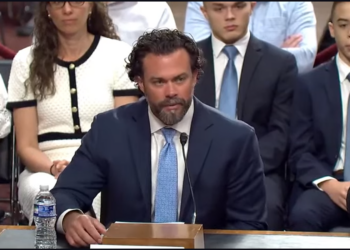Today’s edition of NBC’s Meet the Depressed saw Kevin Hassett, Director of the White House National Economic Council, berated by host Kristen Welker, who repeatedly demanded Hassett provide “hard evidence” to justify the recent dismissal of the head of the Bureau of Labor Statistics.
Watch as Hassett calmly handles Welker’s demands for “evidence” (click “expand” to view transcript):
KRISTEN WELKER: And joining me now is the director of the White House National Economic Council, Kevin Hassett. Mr. Hassett, welcome to Meet the Press.
KEVIN HASSETT: It’s great to be here. Thank you.
WELKER: It’s great to have you here. Let’s start with President Trump’s decision to fire the head of the Bureau of Labor Statistics, Erika McEntarfer, who he accused of manipulating job numbers. Mr. Hassett, what evidence does the administration have that she manipulated the jobs numbers?
HASSETT: Right. Well, what we’ve seen over the last few years is massive revisions to the jobs numbers. In fact they were extremely reliable, the kind of numbers that you want to guide policy decisions and markets through Covid. And then when Covid happened because response rates went down a lot, then revision rates skyrocketed. So the typical monthly revision often was bigger than the number itself. And now we had a number that just came out, the actual number for the month wasn’t so bad. But the two months before were revised down by more than it ever happened since 1968. And in 2015, Alan Greenspan and I were asked to attend a conference at BLS where we were asked to give advice about how to modernize the data. And we warned that if they didn’t try to let the data collection and calculation keep up with the data that was happening in the economy that we would have problems like this. And, finally, in the U.K. they had a very similar problem. And in 2023, they had to for a while shut down the data agency of the U.K. for the same kinds of problems.
WELKER: But just to be very clear, do you have – does the administration have any evidence that it was “rigged,” as the president said? And will you be presenting that to the American public?
HASSETT: Well, the evidence is that there have been a bunch of revisions that could —
WELKER: But hard evidence?
HASSETT: Well, I mean, the revisions are hard evidence. There- for example, there was an 800,000 re- an 18- 818,000 revision making the Joe Biden job record a lot worse that came out after he withdrew from the presidential campaign. There have been a bunch of patterns that could make people wonder. And I think the most important thing for people to know is that it’s the president’s highest priority that the data be trusted and that people get to the bottom of why these revisions are so unreliable.
What more evidence did Welker want, besides the constant revisions of jobs data under two presidential administrations? It is unclear, but she continued to press Hassett for it as if he were sitting on a trove akin to the White House tapes.
This is the same media, mind you, that pretends that the massive trove of evidence of wrongdoing in the Russia Hoax Document Drop doesn’t exist. It is almost as if there is a (D)ifference when it comes to the evidentiary standard the media demands before accepting something as factual. It should also be noted that these outlets didn’t ask any questions when all those revisions were published.
The interview would eventually move on to issues such as tariffs, inflation, and interest rates, but not before Welker proceeded to pepper Hassett with 11 different questions from the Bureau of Labor Statistics. The Biden Regime may be out of power, but its media is alive and well.
Click “expand” to view the full transcript of the aforementioned segment as aired on NBC’s Meet the Press on Sunday, August 3rd, 2025:
KRISTEN WELKER: And joining me now is the director of the White House National Economic Council, Kevin Hassett. Mr. Hassett, welcome to Meet the Press.
KEVIN HASSETT: It’s great to be here. Thank you.
WELKER: It’s great to have you here. Let’s start with President Trump’s decision to fire the head of the Bureau of Labor Statistics, Erika McEntarfer, who he accused of manipulating job numbers. Mr. Hassett, what evidence does the administration have that she manipulated the jobs numbers?
HASSETT: Right. Well, what we’ve seen over the last few years is massive revisions to the jobs numbers. In fact they were extremely reliable, the kind of numbers that you want to guide policy decisions and markets through Covid. And then when Covid happened because response rates went down a lot, then revision rates skyrocketed. So the typical monthly revision often was bigger than the number itself. And now we had a number that just came out, the actual number for the month wasn’t so bad. But the two months before were revised down by more than it ever happened since 1968. And in 2015, Alan Greenspan and I were asked to attend a conference at BLS where we were asked to give advice about how to modernize the data. And we warned that if they didn’t try to let the data collection and calculation keep up with the data that was happening in the economy that we would have problems like this. And, finally, in the U.K. they had a very similar problem. And in 2023, they had to for a while shut down the data agency of the U.K. for the same kinds of problems.
WELKER: But just to be very clear, do you have – does the administration have any evidence that it was “rigged,” as the president said? And will you be presenting that to the American public?
HASSETT: Well, the evidence is that there have been a bunch of revisions that could —
WELKER: But hard evidence?
HASSETT: Well, I mean, the revisions are hard evidence. There- for example, there was an 800,000 re- an 18- 818,000 revision making the Joe Biden job record a lot worse that came out after he withdrew from the presidential campaign. There have been a bunch of patterns that could make people wonder. And I think the most important thing for people to know is that it’s the president’s highest priority that the data be trusted and that people get to the bottom of why these revisions are so unreliable.
WELKER: Well, let me ask you about what William Beach, he was the last commissioner of the Bureau of Labor Statistics. He was appointed by President Trump. He was sharply critical of this decision to get rid of his successor. I want to read you what he wrote. He says, quote, “These numbers are constructed by hundreds of people. They’re finalized by about 40 people. These 40 people are very professional people who’ve served under Republicans and Democrats. And the commissioner does not see these numbers until the Wednesday prior to the release on Friday. By that time, the numbers are completely set into the IT system. They’ve been programmed. They are simply reported to the commissioner so the commissioner can on Thursday brief the president’s economic team. The commissioner doesn’t have any hand or any influence or any way of even knowing the data until they are completely done.” Isn’t this the very definition of shooting the messenger?
HASSETT: No, absolutely not. I mean, the bottom line is that there were people involved in creating these numbers. And if I were running the BLS and I had a number that was a huge politically important revision, the biggest since 1968, actually revisions should be smaller, right? Because computers are better and so on. Then I would have a really long report explaining exactly what happened. And we didn’t get that. We didn’t get that. And so right now people, you know, Goldman Sachs, people on Wall Street are wondering, “Where did these revisions come from? And why do they keep happening?” And what we need is a fresh set of eyes over the BLS. And there are great career staffers. One of the top BLS staffers is actually working in the White House to help us understand the jobs numbers. When I saw the jobs revisions, I literally called up that person and said, “I think there’s a typo.” Because I’ve been following these numbers all the way back when I worked with Alan Greenspan for something like 40 years. And I’ve never seen revisions like this.
WELKER: But just to be very clear, I mean, 40 people put these numbers together. Is the president planning to fire all 40 people involved in putting these numbers together?
HASSETT: We’re going to try to get the numbers so that they’re transparent and reliable.
KRISTEN WELKER: President Trump himself was happy to accept the jobs numbers issued under McEntarfer’s leadership when the numbers were good. Take a listen to what he said in the past.
[BEGIN TAPE]
DONALD TRUMP: The numbers were much better as you know than projected by the media.
In three months we have created 350,000 jobs. Think of that.
TRUMP: A lot of jobs are being created. That’s what – that’s what happened this morning.
[END VIDEO]
WELKER: So is the president prepared to fire anyone who reports data that he disagrees with?
HASSETT: No, absolutely not. The president wants his own people there so that when we see the numbers, they’re more transparent and more reliable. And if there are big changes and big revisions – we expect more big revisions for the jobs data in September, for example – then we want to know why. We want people to explain it to us.
WELKER: All right. But bottom line, were the numbers wrong? Do you have any hard evidence that you can present to the American public that these numbers, these revisions that were reported, and there were plenty of revisions under former President Biden including right before the election. Do you have any hard evidence that these numbers were wrong?
HASSETT: Yes. There is very hard evidence that we’re looking at the biggest revision since —
WELKER: Are you going to present those?
HASSETT: – 1968.
WELKER: Are you going to present the evidence —
HASSETT: No, if you look at the number itself, it is the evidence.
WELKER: But just saying it’s an outlier is not evidence, Mr. Hassett.
HASSETT: It’s a historically important outlier. It’s something that’s unprecedented —
WELKER: Still doesn’t —
HASSETT: So unprecedented that —
WELKER: It’s still not evidence though —
HASSETT: – I’ve been looking at it for 40 years. And I’m like, “It must be a typo.”
WELKER: Okay. All right. Let’s move on to tariffs, the other big news of this week. Are the tariff rates locked in? Or are they still up for negotiation?
HASSETT: I think these – we have eight deals that cover about 55% of world GDP with our biggest trading partners, the E.U., Japan, Korea, and so on. And I expect that those matters are more or less locked in. Although there’ll have to be some, you know, dancing around the edges about exactly what we mean when we do this or that. For the deals that aren’t ready yet, they’re going to get the reciprocal rates, you know, soon. And then we would expect that there might continue to be negotiations with those countries.
WELKER: But for those eight deals that you say are deals that are announced, you’re saying “more or less.” Are they locked in?
HASSETT: Yes. I mean, the president will decide what the president decides. But the president likes those deals. The Europeans like those deals. And they’re absolutely historically wonderful deals. Think about it. We’ve got Europe agreeing to open their markets to our products so our farmers, our small businessmen can sell stuff in Europe like they never could before. And they’re letting us charge a 50% tariff, which is going to raise maybe about $100 million a year.
WELKER: And I think people are curious because they remember that back in April when President Trump first announced these tariffs, he then backtracked when the bond market was spooked. Could a market reaction prompt President Trump to change these tariff rates again?
HASSETT: The markets have seen what we’re doing and celebrated it. And so I don’t see how that would happen.
WELKER: Okay, but not ruling it out.
HASSETT: No, I would rule it out. Because these are the final deals.
WELKER: All right. Let’s talk about prices now. New inflation data released this week shows higher prices on products like household furniture, clothing. You have companies like Adidas, Procter & Gamble, Black and Decker all saying they will increase prices. They cite the tariffs. Prices are already up on some of Amazon’s products. As you know, President Trump campaigned on a promise to bring prices down. What is your message to Americans who feel like the president’s breaking that promise?
HASSETT: Well, he’s not. In fact every measure of inflation, if you aggregate it, if you look at the top-line numbers, is lower than it’s been in five months. And we just had the GDP released this week, which was a healthy 3%. And the most important GDP inflation number said it was 2.1%. And so inflation has come down a lot. That number by the way, the 2.1% was 3.7%. That’s the number that President Trump inherited. And so inflation has come down. And inflation has come down for a lot of reasons. But I think the main reason is that we’re no longer printing money and sending it to people like the Bidens did. That’s a recipe for inflation.
WELKER: Okay. Let me ask you about this talk of tariff rebates. The president consistently arguing that consumers don’t pay tariffs. If that is the case, Mr. Hassett, why would you issue a rebate?
HASSETT: Well, what’s going to happen, right, is the CBO has estimated that we’re going to get $3 trillion more in revenue. And so what Congress is going to do when they see all the revenue is they’re going to decide, “What are we going to do with it?” They could use it all to reduce the debt. Or they could give some of it back to consumers. And the president looks forward to working with Congress in the second half of the year to decide on what the best way to use that money is. In fact, we think the CBO estimate of $3 trillion is now pretty low, given the new deals that we’ve had.
WELKER: What do you think Congress should do? Rebates or work to pay down the debt? Because you have, for example, some Republican senators, Senator Rick Scott, “We ought to do everything we can to give money back to the American public. But we’ve got to first balance our budget.”
HASSETT: Well, I think that there are a lot of people that think that balancing the budget is the top priority for the economy right now. But we’re also mindful of the fact that there’s a legislative process where people dicker over the details. And so I’m not sure. I can’t predict right now which way it’s going to end up.
WELKER: There’s been a lot of focus on Fed chair Jerome Powell, obviously President Trump really pressuring him to lower interest rates, which he did not do. So the question becomes, “Who will replace him once his term ends?” If President Trump taps you to be the next Fed chair, will you accept? Do you want to be?
HASSETT: You know, I’ve been working with the president for about eight years. And, you know, as one of his closest economic advisors, of course, we’ve talked about the Federal Reserve. Right now he’s set up an active search with Secretary Bessent. And they’re going to go through a list of names. And I’m sure the president will pick the best available person.
WELKER: Well, if that’s you, will you say yes?
HASSETT: We’ll have to see if he chooses me. But I think that I have the best job in the world. And I – really well placed at the National Economic Council —
WELKER: In general, should a Fed chair take direction from the Oval Office, or from the economic conditions?
HASSETT: I think that a Fed chair should listen to all the voices, especially their critics, to try to think about, “What am I getting right? What am I getting wrong?” The Fed chair also has a transparency responsibility, which I think that Jay has fallen down on a little bit. That if you’re going to come out and say, for example, that you think that tariffs are going to cause inflation, then for goodness sake, you should put out a model that explains how much inflation and why you think that way. Because there are others that disagree. Have a lively academic debate, and if you go to actually put your finger on the scale of “tariffs cause inflation,” then you need to explain why. I don’t think that the Fed or the BLS should be a black box. I think it should be transparent.
WELKER: All right. Before I let you go, President Trump has now been in office for more than six months. Is this now the Trump economy?
HASSETT: I mean, there is definitely a lot of policy yet to happen. We’ve just passed the Big, Beautiful Bill. It’s going into effect in July. And it’s going to have massive impact on the economy. There are residual problems that we’ve inherited, in part, the runaway spending from the previous term. And so whose economy is it is more of a political question than an economist question.
WELKER: Well, but you just touted all the benefits that you see at this point —
HASSETT: With the eye on the horizon.
WELKER: Does the president own the economy at this point? He’s been in office for six months.
HASSETT: With the eye on the horizon, the economic outlook is huge. It’s great. We’ve got the Big, Beautiful Bill. We’ve got AI increasing productivity. We’ve got everything. And we’ve got all the tariff revenue coming in. So we have every confidence that the economy is headed way, way up from here.
WELKER: All right. Kevin Hassett, thank you so much —
HASSETT: Thank you.
WELKER: – for being here.
HASSETT: It’s great to be here.
WELKER: And we really appreciate it.
















